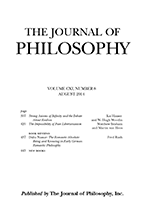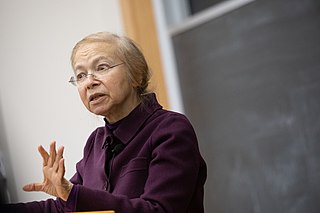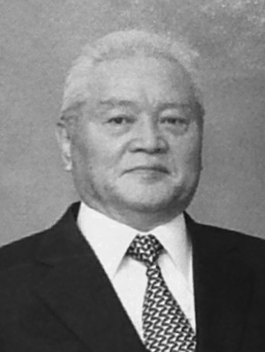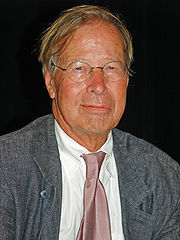
Nick Bostrom is a philosopher known for his work on existential risk, the anthropic principle, human enhancement ethics, whole brain emulation, superintelligence risks, and the reversal test. He was the founding director of the now dissolved Future of Humanity Institute at the University of Oxford and is now Principal Researcher at the Macrostrategy Research Initiative.

Human extinction is the hypothetical end of the human species, either by population decline due to extraneous natural causes, such as an asteroid impact or large-scale volcanism, or via anthropogenic destruction (self-extinction), for example by sub-replacement fertility.

Anders Sandberg is a Swedish researcher, futurist and transhumanist. He holds a PhD in computational neuroscience from Stockholm University, and is a former senior research fellow at the Future of Humanity Institute at the University of Oxford.

Janet Radcliffe Richards is a British philosopher specialising in bioethics and feminism and Professor of Practical Philosophy at the University of Oxford. She is the author of The Sceptical Feminist (1980), Philosophical Problems of Equality (1995), Human Nature after Darwin (2000), and The Ethics of Transplants (2012).
Jonathan Glover is a British philosopher known for his books and studies on ethics. He currently teaches ethics at King's College London. Glover is a fellow of the Hastings Center, an independent bioethics research institution in the United States, and is a Distinguished Research Fellow at the Oxford Uehiro Centre for Practical Ethics.

Julian Savulescu is an Australian philosopher and bioethicist of Romanian origins. He is Chen Su Lan Centennial Professor in Medical Ethics and director of the Centre for Biomedical Ethics at National University of Singapore. He was previously Uehiro Chair in Practical Ethics at the University of Oxford, Fellow of St Cross College, Oxford, director of the Oxford Uehiro Centre for Practical Ethics, and co-director of the Wellcome Centre for Ethics and Humanities. He is visiting professorial fellow in Biomedical Ethics at the Murdoch Children's Research Institute in Australia, and distinguished visiting professor in law at Melbourne University since 2017. He directs the Biomedical Ethics Research Group and is a member of the Centre for Ethics of Pediatric Genomics in Australia. He is a former editor and current board member of the Journal of Medical Ethics, which is ranked as the No.2 journal in bioethics worldwide by Google Scholar Metrics, as of 2022. In addition to his background in applied ethics and philosophy, he also has a background in medicine and neuroscience and completed his MBBS (Hons) and BMedSc at Monash University, graduating top of his class with 18 of 19 final year prizes in Medicine. He edits the Oxford University Press book series, the Uehiro Series in Practical Ethics.

The Journal of Philosophy is a monthly peer-reviewed academic journal on philosophy, founded in 1904 at Columbia University. Its stated purpose is "To publish philosophical articles of current interest and encourage the interchange of ideas, especially the exploration of the borderline between philosophy and other disciplines." Subscriptions and online access are managed by the Philosophy Documentation Center.

Luciano Floridi is an Italian and British philosopher. He is the director of the Digital Ethics Center at Yale University. He is also a Professor of Sociology of Culture and Communication at the University of Bologna, Department of Legal Studies, where he is the director of the Centre for Digital Ethics. Furthermore, he is adjunct professor at the Department of Economics, American University, Washington D.C. He is married to the neuroscientist Anna Christina Nobre.

The Mathematical Institute is the mathematics department at the University of Oxford in England. It is one of the nine departments of the university's Mathematical, Physical and Life Sciences Division. The institute includes both pure and applied mathematics and is one of the largest mathematics departments in the United Kingdom with about 200 academic staff. It was ranked as the top mathematics department in the UK in the 2021 Research Excellence Framework. Research at the Mathematical Institute covers all branches of mathematical sciences ranging from, for example, algebra, number theory, and geometry to the application of mathematics to a wide range of fields including industry, finance, networks, and the brain. It has more than 850 undergraduates and 550 doctoral or masters students. The institute inhabits a purpose-built building between Somerville College and Green Templeton College on Woodstock Road, next to the Faculty of Philosophy.

The Future of Humanity Institute (FHI) was an interdisciplinary research centre at the University of Oxford investigating big-picture questions about humanity and its prospects. It was founded in 2005 as part of the Faculty of Philosophy and the Oxford Martin School. Its director was philosopher Nick Bostrom, and its research staff included futurist Anders Sandberg and Giving What We Can founder Toby Ord.
The Centre for Human Bioethics is the previous name of a research and teaching centre at Monash University, based in the Faculty of Arts. The Centre is now known as the Monash Bioethics Centre. It focusses on the branch of ethics known as bioethics, a field relating to biological science and medicine. It was founded in October 1980 by Professors Peter Singer and Helga Kuhse, as the first centre in Australia devoted to bioethics, and one of the first in the world.

Frances Myrna Kamm is an American philosopher specializing in normative and applied ethics. Kamm is currently the Henry Rutgers University Professor of Philosophy and Distinguished Professor of Philosophy at Rutgers University in New Brunswick, New Jersey. She is also the Littauer Professor of Philosophy and Public Policy Emerita at Harvard University's John F. Kennedy School of Government, as well as Professor Emerita in the Department of Philosophy at New York University.
Cecil Anthony John Coady, more commonly publishing as C. A. J. Coady and less formally known as Tony Coady, is a prominent Australian philosopher with an international reputation for his research, particularly in epistemology but also in political and applied philosophy. Coady's best-known work relates to the epistemological problems posed by testimony, most fully expounded in his book Testimony: a Philosophical Study. It was influential in establishing a new branch of inquiry within the field of epistemology. He is also well known for his publications on issues related to political violence. Coady is a regular commentator in the Australian media on philosophical aspects of public affairs.
The Wilde Professorship of Mental Philosophy is a chair in philosophy at the University of Oxford. Its holder is elected to a Fellowship of Corpus Christi College.
Population ethics is the philosophical study of the ethical problems arising when our actions affect who is born and how many people are born in the future. An important area within population ethics is population axiology, which is "the study of the conditions under which one state of affairs is better than another, when the states of affairs in question may differ over the numbers and the identities of the persons who ever live."
Roger Stephen Crisp is fellow and tutor in philosophy at St. Anne's College, Oxford. He holds the university posts of Professor of Moral Philosophy and Uehiro Fellow and Tutor in Philosophy. His work falls principally within the field of ethics, in particular metaethics, normative ethics, and applied ethics. In addition, he is chairman of the Management Committee of the Oxford Uehiro Centre for Practical Ethics.
The Oxford Centre for Buddhist Studies (OCBS) was founded in 2004 by Prof Richard Gombrich, Emeritus Boden Professor of Sanskrit at the University of Oxford. The centre was a recognised independent centre of the University of Oxford.
John Tasioulas is a Greek-Australian moral and legal philosopher. He is the inaugural Director of the Institute for Ethics in AI, and Professor of Ethics and Legal Philosophy, Faculty of Philosophy, University of Oxford. He holds dual Australian and British citizenship.
The various academic faculties, departments, and institutes of the University of Oxford are organised into four divisions, each with its own Head and elected board. They are the Humanities Division; the Social Sciences Division; the Mathematical, Physical and Life Sciences Division; and the Medical Sciences Division.

Eiji Uehiro was a Japanese ethicist, social educator, and writer. He was the founder of the Uehiro Foundation on Ethics and Education, in 1987, and the Oxford Uehiro Centre for Practical Ethics, in 2003.
















